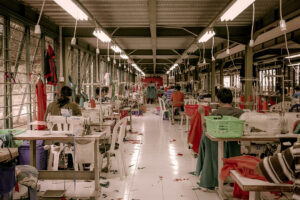THE Confederation of Wearable Exporters of the Philippines (CONWEP) said a major European apparel brand canceled its Philippine orders because they are not covered by a free trade agreement (FTA) between the Philippines and the European Union (EU).
CONWEP Executive Director Maritess Jocson-Agoncillo told reporters on the sidelines of a briefing in Makati City on Aug. 1 that the orders were transferred to Vietnam and Cambodia.
She did not identify the customer.
She added that the absence of an FTA “is affecting us” in terms of foregone exports and job security of garment workers, Ms. Jocson-Agoncillo said.
Ms. Jocson-Agoncillo valued the lost potential exports at $200-$300 million each year and estimated the number of impacted workers at 4,800 to 6,000.
The resumption of FTA negotiations with the EU was announced on July 31 by President Ferdinand R. Marcos, Jr. and European Commission (EC) President Ursula von der Leyen.
Official FTA negotiations between the EU and the Philippines were launched in December 2015, with the last taking place in 2017. The FTA talks were delayed due to issues concerning intellectual property rights and data exclusivity, among others.
Trade Secretary Alfredo E. Pascual said preliminary talks on the FTA will begin in September, due for completion within the year. Formal negotiations are expected to begin by 2024.
The Department of Trade and Industry (DTI) has said that the average tariff for wearables exports is 12%.
Ms. Jocson-Agoncillo said Vietnam has an FTA with the EU and Cambodia has an Everything But Arms (EBA) agreement that removes all tariffs except for those on weapons and ammunition. Ms. Jocson-Agoncillo said.
Meanwhile, Trade Undersecretary Ceferino S. Rodolfo said during the International Tobacco Agricultural Summit in Taguig City on Wednesday that the Philippines could be a manufacturing hub for heated tobacco products (HTPs) if it harnesses FTAs.
“Through FTAs, the Philippines can serve as a manufacturing hub to supply HTPs to key markets,” Mr. Rodolfo said.
Mr. Rodolfo said that if manufactured in the Philippines, HTPs could be imported into ASEAN nations except Vietnam, as well as by Australia, New Zealand, Japan, South Korea, and Hong Kong, at zero tariff.
“Given single-digit growth of global demand for tobacco products and the foreseen reduction in local demand for conventional cigarettes, HTPs present a viable market opportunity and (potential source of) government tax revenue,” Mr. Rodolfo said.
“The Philippines is a global player when it comes to conventional tobacco products. While its footprint is currently small, opportunities to specialize and be globally competitive in emerging segments/high-tech products such as HTPs emerges,” he added.
He said companies are looking to tap the opportunities posed by HTPs.
“Multinational companies are actively exploring this opportunity in the Philippines. Philip Morris Fortune Tobacco Corp. is reported to have a plan to invest P9 billion in a state-of-the-art facility in Tanauan, Batangas that will produce HTPs for its IQOS devices,” Mr. Rodolfo said.
“Other potential leads may include Japan Tobacco International, British American Tobacco, China Tobacco and manufacturers of locally distributed HTP brands such as Bohem Cigar, Esse and Liqun,” he added. — Revin Mikhael D. Ochave

